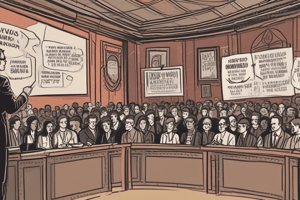Podcast
Questions and Answers
Which rhetorical device involves repeating the initial consonant sound in a series of words?
Which rhetorical device involves repeating the initial consonant sound in a series of words?
- Alliteration (correct)
- Hyperbole
- Simile
- Metaphor
What is the main purpose of using hyperbole as a rhetorical device?
What is the main purpose of using hyperbole as a rhetorical device?
- To describe an object or action in a non-literal way
- To make direct comparisons between two things
- To provide extreme exaggeration for emphasis (correct)
- To repeat the initial consonant sound in a series of words
In 'She ran like the wind,' what type of rhetorical device is being used?
In 'She ran like the wind,' what type of rhetorical device is being used?
- Hyperbole
- Metaphor
- Alliteration
- Simile (correct)
Why do speakers use metaphors in speeches?
Why do speakers use metaphors in speeches?
Which rhetorical device is often used to emphasize certain points when spoken aloud?
Which rhetorical device is often used to emphasize certain points when spoken aloud?
'He was a shining star.' What rhetorical device is used in this sentence?
'He was a shining star.' What rhetorical device is used in this sentence?
What is personification?
What is personification?
Which rhetorical device engages the audience but does not expect an answer?
Which rhetorical device engages the audience but does not expect an answer?
What does repetition aim to achieve in a speech?
What does repetition aim to achieve in a speech?
When an ironical statement is made, what does it imply?
When an ironical statement is made, what does it imply?
How does an analogy help in conveying ideas effectively?
How does an analogy help in conveying ideas effectively?
In a speech, which rhetorical device can reinforce campaign messages effectively?
In a speech, which rhetorical device can reinforce campaign messages effectively?
Flashcards are hidden until you start studying
Study Notes
Rhetorical Devices in Speeches
Rhetoric is the art of persuasion through speech. In public speaking, rhetorical devices play a crucial role in engaging audiences and conveying ideas effectively. These techniques can create emotional impact, aid comprehension, and support arguments. Let's explore some common types of rhetorical devices used in speeches.
Metaphor
A metaphor is a figure of speech that describes an object or action in a way that isn't literally true, but helps explain an idea or make a comparison. For example, if someone says, "He was a shining star," they are using a metaphor to describe the person's excellence. Metaphors can help listeners understand complex concepts by comparing them to familiar things.
Simile
A simile is similar to a metaphor, but it uses 'like' or 'as' to compare two different things. For instance, "She ran like the wind." This means she ran very fast just like how the wind moves rapidly. Similes make comparisons easier to follow.
Alliteration
Alliteration involves repeating the initial consonant sound in a series of words. It makes phrases more memorable and fun to listen to. An example would be saying "Jill jumped joyfully". Alliterations can also emphasize certain points when spoken aloud.
Hyperbole
Hyperbole is an extreme exaggeration that isn't meant to be taken literally. It's often used for emphasis or to get an audience's attention. For example, saying "I am so hungry I could eat a horse" implies being extremely hungry, but nobody could literally eat a horse.
Irony
Irony is when the intended meaning is the opposite of what is said. For instance, if someone says, "I love Mondays," but they actually hate Mondays, this would be an example of irony. It can be used to make a point or provoke thought.
Repetition
Repetition is when a word, phrase, or idea is repeated throughout a speech. This can reinforce the speaker's main points and make them more memorable. For example, if a politician repeatedly uses the phrase "change for the better," this repetition reinforces their campaign message.
Analogy
An analogy is a comparison between two things that aren't alike, but have similar characteristics. For instance, saying "Managing a company is like conducting an orchestra" implies that both require coordinating many parts to achieve a successful result. Analogies can help listeners understand abstract concepts by drawing connections to familiar ones.
Personification
Personification gives human qualities to non-human things or ideas. For example, if someone says, "The wind howled in protest," they are personifying the wind. This can make abstract concepts more relatable and easier to understand.
Rhetorical Questions
A rhetorical question is a question asked for effect rather than expecting an answer. It's a way to engage the audience and get them thinking about the topic. For example, a politician might ask, "Do we want our children to grow up in a world where violence is the norm?" This question implies a yes or no answer but isn't expecting one, it's designed to engage the audience in thoughts about the topic.
These are just a few of the many rhetorical devices that can enhance speeches and make them more memorable and effective.
Studying That Suits You
Use AI to generate personalized quizzes and flashcards to suit your learning preferences.




